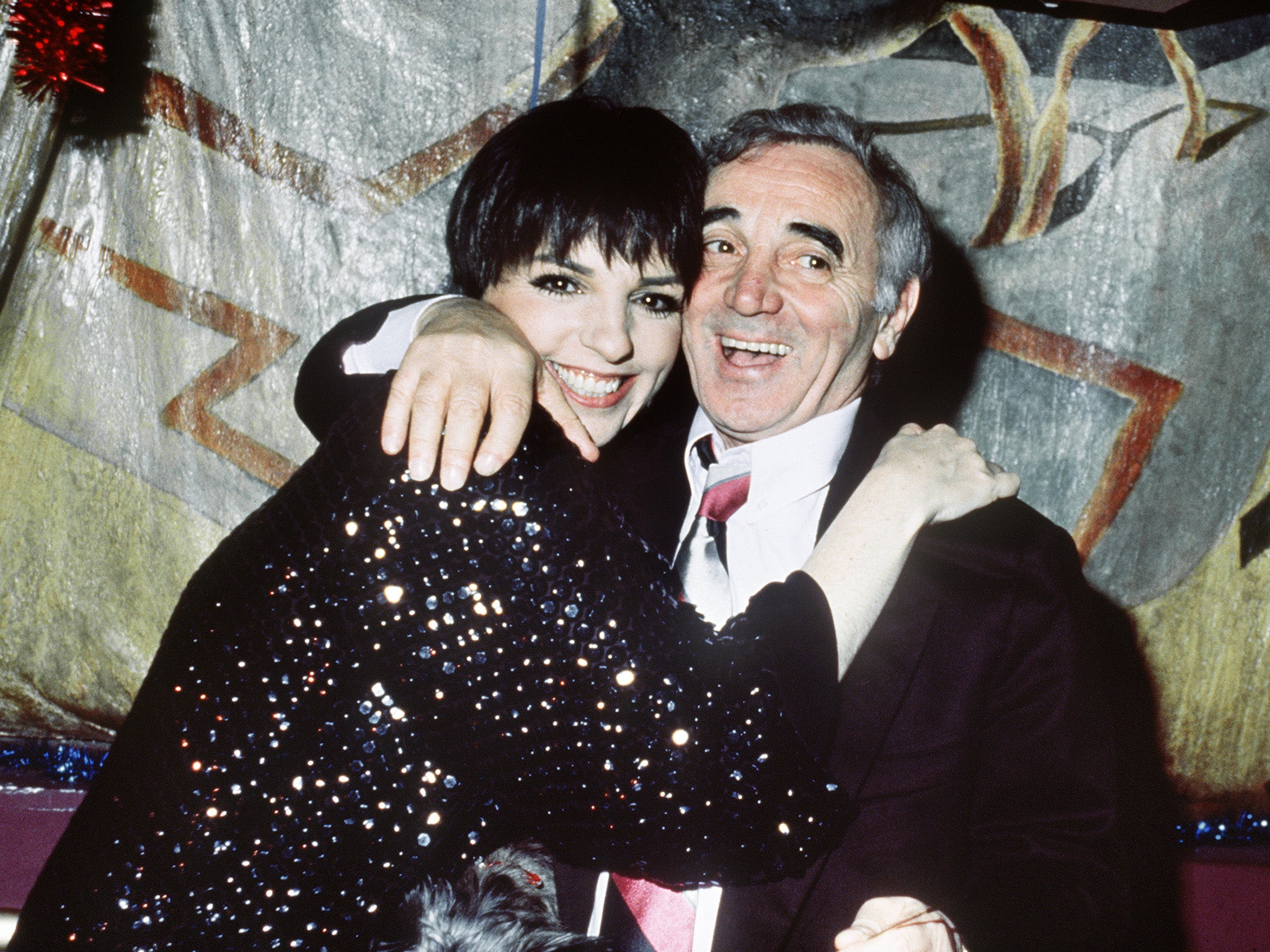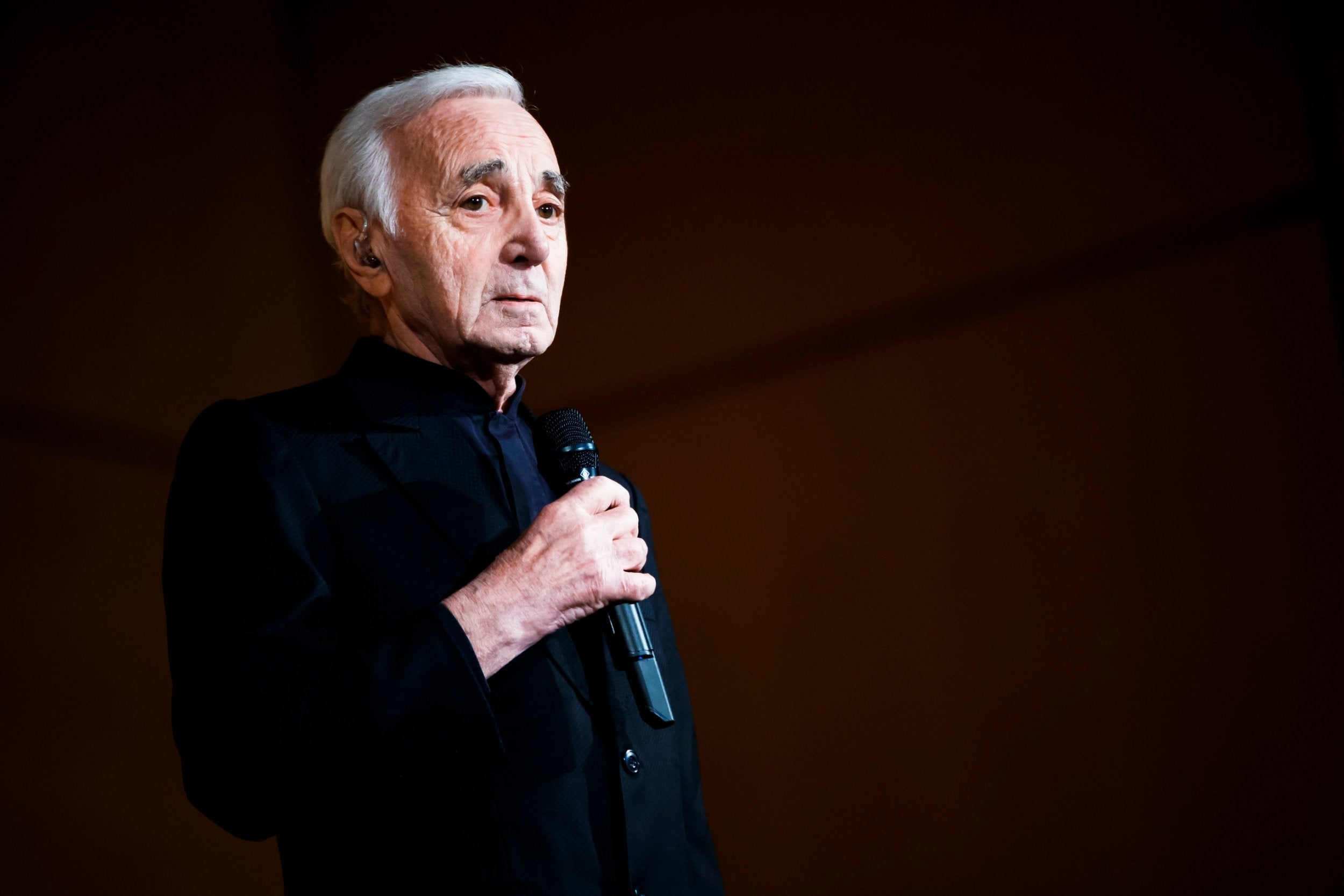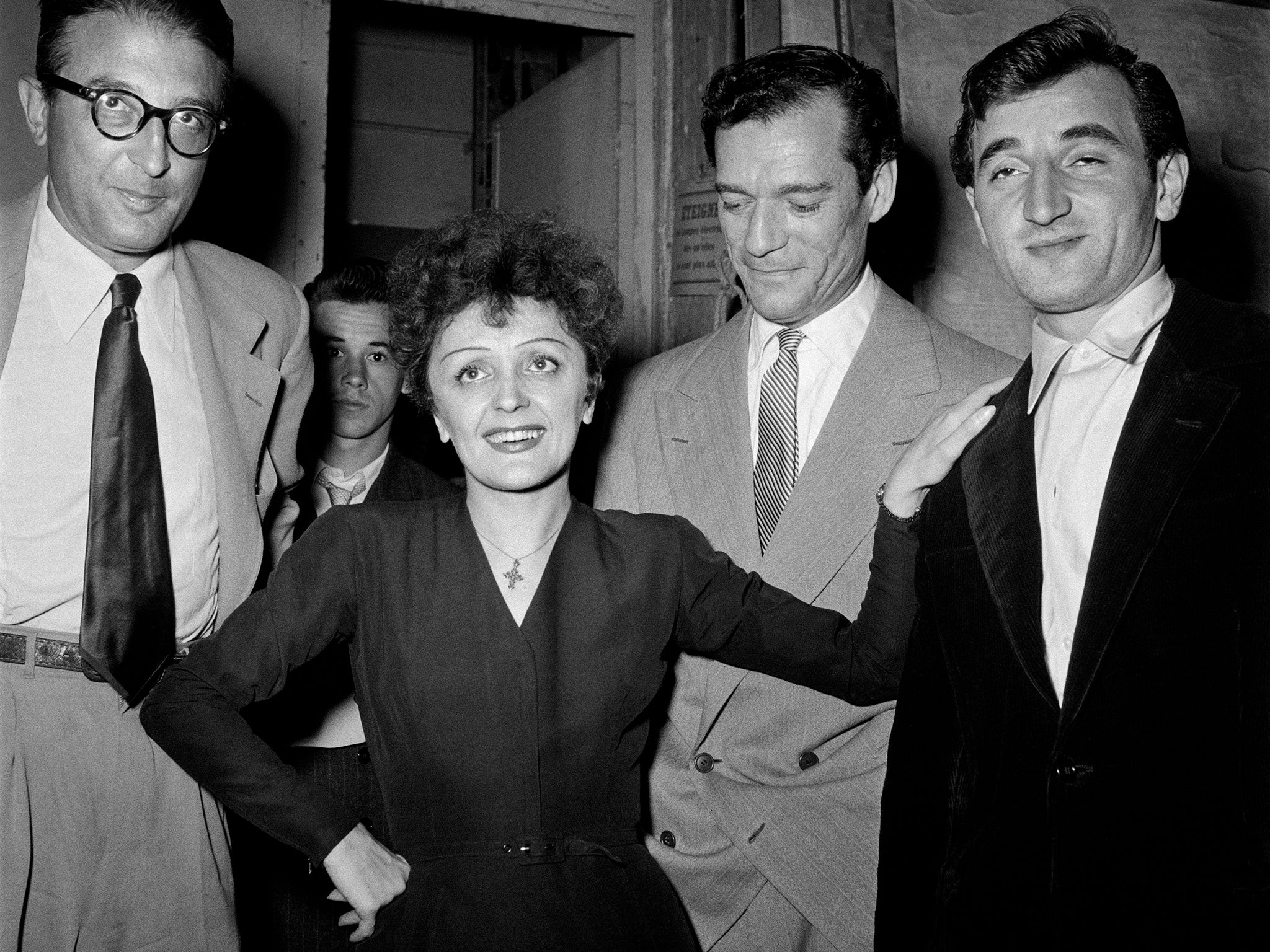Charles Aznavour: French singer championed by Edith Piaf who never forgot his Armenian roots
Even in his nineties, he performed 90-minute concerts, capping a career spanning 60 years in which he distinguished himself as a legend – of both France and Armenia. By Spencer Leigh

It would be difficult to place the master practitioners of the French chanson in order of merit, but Charles Aznavour, who has died aged 94, was unique with his vast output, his aptitude to write compassionately about intensely personal matters and his ability to perform 90-minute concerts even in his nineties in the world’s major theatres. A box set of no less than 60 CDs released in 2015 stands as testament to his body of work.
He was not an angry writer like Jacques Brel nor sex-obsessed like Serge Gainsbourg, and this worked in his favour as middle-of-the-road audiences around the world wanted to hear him sing “She”, “The Old-Fashioned Way” and “Yesterday When I Was Young”. But many of his best known songs were queasy rather than easy listening.
“For all his success, Charles Aznavour is very underrated,” says Marc Almond, whose career began with Soft Cell. “He and Jacques Brel had so much in common although in other ways they were miles apart. Aznavour is much more sentimental and nostalgic than Brel, who was world-weary and cynical, although both can be romantic. The general public thinks that ‘She’ and songs like that are all that Aznavour did and they are so wrong. It is a huge and varied catalogue.”
When I saw Charles Aznavour at the Royal Albert Hall in 2015, he introduced Herbert Kretzmer by saying he had been “working for me over the years”, which made his English lyricist sound like his roadie. In fact, Aznavour’s sensitive and poetic lyrics have been beautifully served by Kretzmer, who also persuaded him in 1974 to write the theme music for a London Weekend Television drama series, The Seven Faces Of Woman.

“They wanted a song about a woman’s mystique,” Kretzmer told me, “and I felt it should be a song about a woman as seen by a man, and what better man than Charles Aznavour, who sings about love and romance. I brought him into the project and it turned out terribly well.”
But writing that theme song was no easy ride: “The first verse could only run for 35 seconds, the time before the play began, and it had to run over the main titles and be complete in itself. Then it had to be stretched out for a record so that it did not sound like padding. At the time, Aznavour was touring all over the place and it took some time to get a melody from him. The moment he played me that long, opening note, the word ‘She’ jumped into my mind and I knew we had the song.”
“She” topped the UK charts and was again a hit in 1999 when Elvis Costello revived it for the opening credits of the film Notting Hill. After singing “She” in 2015, Aznavour joked, “I think, ‘Who is this stupid man who demands these long notes’, but then I realise the songwriter is me.”
Although Charles Aznavour was born in Paris in 1924, he did not consider himself a Frenchman. “I am Armenian,” he told me proudly in 1979. “Everybody figures that I am a Frenchman because I sing in French. I act like a Frenchman and I have all the symptoms of a Frenchman but my parents are Armenian.”
His parents, Mamignon (known as Misha) and Knar Aznavourian, had left Armenia when the Turks started killing the Armenians. Aznavour was to write about it in “Ils Sont Tombés (They Fell)” in 1975:
And I am of that race
Who died in unknown places
Who perished in their pride
Whose blood in rivers ran
His father Misha ran a small restaurant in Paris but it never made much money because Misha would feel obliged to feed any homeless Armenian adrift in the city. He imbued his son with a love of singing, while his mother showed him how to write poetry in Armenian. He went to an acting school, appearing in his first film when he was nine years old. He was to appear in several French, English and American films, usually in cameos. He played the title role in Tirez sur le Pianist (“Shoot The Piano Player”), a 1960 film directed by Francois Truffaut.
In 1942 Aznavour teamed up with Pierre Roche and they wrote and performed songs together including one of his best-known “J’ai bu (I drank)”, often singing in the Forbidden Zone in war-torn Paris. Aznavour and his family helped the resistance by hiding Jews who were on the run. After the war, Roche and Aznavour had success in cabaret in Canada but Aznavour’s first wife wanted to return to France, while Roche wanted to marry a Canadian girl.
‘You idiot! You have given my song to that girl. Now I’ll have to show her how to sing it’
Now performing on his own, Aznavour was championed by the leading French singer, Edith Piaf. Piaf was always looking for good songs as Aznavour explained: “I think ‘Il Pleut’ was the first song that Piaf liked of mine and she recorded seven of them. No. I correct that. I translated Frankie Laine’s ‘Jezebel’ for her and that makes it seven and a half. When I gave her ‘Je hais les Dimanches (I Hate Sundays)’, she said, ‘Give that to an existentialist singer.’ I took her at her word and gave it to Juliette Gréco. She was up in arms when she heard what I had done. She said, ‘You idiot! You have given my song to that girl. Now I’ll have to show her how to sing it.’ So Piaf made a record of it too.”
Aznavour was never one of Piaf’s lovers, but she did arrange for him to have a new nose: “I am very glad about that. I used to use up as many handkerchiefs as a whole orphanage.” Although Aznavour was no pin-up, he had a very compelling look. Like Piaf, he performed with multiple gestures and he often acted out his songs like Marcel Marceau, being a frustrated painter in “La Bohème”. It certainly helped when he was performing French songs to an English audience.
Aznavour was impressed by the way Charles Trenet could put poetical thoughts and images into his songs. Even when he was a young man, Aznavour was writing about death and old age, never better than in “Yesterday When I was Young (Hier Encore)”, first released in 1964.
Yesterday the moon was blue
And every crazy day brought something new to do
I used my magic age as if it were a wand
And never saw the waste and emptiness beyond
In the rock world, there has been much critical commentary about Bob Dylan, Paul McCartney, Paul Simon and Warren Zevon writing about ageing but it was a normal state for Aznavour, almost his default position. In later years, he would joke on stage: “My songs have been waiting for me to get old.”
In January 1964 the Beatles were becoming the biggest selling and most popular act in the world. They were very successful at the Paris Olympia but for all that the best-selling record in France was Charles Aznavour’s “La mamma”, although the Beatles had two songs in the Top 10. “La Mamma” was given an English lyric, “For Mama”, by Don Black and it became a UK hit for Matt Monro.

In 1973 Aznavour found international success with “The Old Fashioned Way (Les Plaisirs Démodés)” which had been prompted by the friction between the rock and the pop singers in France. He famously performed it at the Royal Variety Performance in 1975 when he turned his back on the audience and pretended he was being caressed by his partner. With the Goodies mocking him as well, soon the whole of the UK was impersonating “Charles Aznovoice”.
The B-side of the French single of “Les Plaisirs Démodés” was “Comme ils dissent”, which he recorded in English as “What Makes a Man”. It is a highly sensitive song about a drag act in a striptease bar and his relationships with those around him:
Each night the men look so surprised
I change my sex before their eyes
Tell me if you can
What makes a man a man?
The song was recorded by Marc Almond in 1992: “I love that song as it has a beginning and an end and it tells a story. I first saw it performed by a drag queen who was removing the makeup and wig and dress as he sang and then he put on his raincoat and fedora and went into the street. I would love to do it that way myself but I can’t really see myself in heels and a wig.”
Aznavour liked writing about subjects that were new to popular songs. He painted a bleak picture of married life in “You’ve Let Yourself Go (Tu t’laisses aller)”, in which his partner is now argumentative and overweight, but at the same time the song is considerate and sympathetic. Similarly, there is the frustration of “Happy Anniversary (Bon Anniversaire)” where everything that could go wrong does go wrong on his 20th wedding anniversary.
“I loved working on his songs,” says Herbert Kretzmer, “I’m generalising but the American songwriters have only got two themes – one is ‘Life is good, hooray!’, and the other is ‘Life is awful, let’s sing the blues about it.’ They think that covers the spectrum, but Aznavour covers the infinite complexities of life.”
Although Aznavour could speak good English, he was unsure about writing English lyrics himself. “When I first came to England, I heard people saying ‘Shit, I’ve done this’ or ‘Shit, I’ve done that’ and I wrote ‘Pretty Shitty Days’. I didn’t know that it was not a nice word.”
Jack Jones recorded a tribute album Write Me A Love Song, Charlie in 1975 and as his songs were being recorded by the world’s most popular singers, he became wealthy, but in 1976 he was found guilty of illegally channelling his earnings into Switzerland and was fined 10 million francs. He showed no remorse about this in his autobiography, Yesterday When I Was Young, in 1979, writing “It is useless to argue with them.” But Aznavour was not an avaricious man, undertaking much charitable work, especially for survivors from the earthquake in Armenia in 1988.
Aznavour often toured with Liza Minnelli and they made a passionate live album, Paris – Palais des Congrès: Intégrale du Spectacle in 1995. Minnelli’s performance of his song “Sailor Boys” is a high point of both their careers. Minnelli was one of the guests on another double CD, Duos (2008), in which celebrities such as Elton John, Carole King and Sting joined him for English and French versions of the same song. With the aid of modern technology, he joined Frank Sinatra on “You Make Me Feel So Young”, a rare example of Aznavour not singing his own material. Although Bob Dylan was not included, he has performed Aznavour’s “The Times We’ve Known (Les Bons Moments)” in concert.
As Aznavour was a proud man with a fear of rejection, he would never ask Herbert Kretzmer to write an English lyric for one of his songs. Rather, he would play him the original version and wait for Kretzmer to ask if he could do something with it. Kretzmer felt that his musical Lautrec was not right for the West End and passed on it, and it only lasted a few weeks in 2000. More recently, it has been substantially reworked for a Broadway show My Paris in 2016.
Aznavour married his third wife, the model Ulla Thorsell, in Las Vegas in 1967 and outside of touring and writing, he spent his later years with his children and grandchildren, one of his granddaughters being a backing vocalist for him. He enjoyed performing to the end, his final concert appearances being in Japan in September. “Some singers have their voices enhanced with technical tricks. There is nothing anyone can do with this broken voice. This is my real voice you are hearing.” There was never any doubt about that.
Chalnough Vaghnag Aznavourian, Charles Aznavour, singer and songwriter, born 22 May 1924 Paris, married Micheline Ragel (divorced); one daughter; married Evelyne Plessis (divorced); married Ulla Thorsell 1967; two sons, one daughter; died, 1 October 2018, Mouriés, France
Join our commenting forum
Join thought-provoking conversations, follow other Independent readers and see their replies
Comments